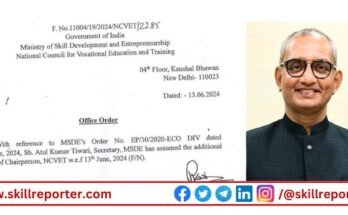National Council for Vocational Education and Training (NCVET) invites Request for Proposal (RFP) for Selection of an agency for Elearning and classroom content development through Sankalp Program of World Bank.
In order to facilitate smooth transition of the learners to the workplace in different organizations in the country and across the globe, NCEVT has identified and classified various types of Employability Skills, Soft-Skills, LifeSkills and Competencies required to be integrated and provided along with Vocational Education, Training and Skilling for Job Roles/ Qualifications at various levels for Long Term Trainings (LTTs), Short Term Trainings (STTs), as also Vocational Education, Training and Skilling in Schools, Technical and Higher Education.
Objectives of this RFP
The project aims to develop a flexible model of Employability Skills (ES), Life Skills (LS) and Soft Skills (SS) and in a dynamic framework. The focus is to provide solution to the Awarding Bodies, which gives them flexibility to develop NOSs by assembling the required modules/sub-modules as per the industry/job role requirement and the target learners.
NCVET strives to provide a broad-based bucket of exhaustive pool of ES/LS/SS modules/sub-modules which would include 21st Century skills and also address the sectoral and industry demand as well as general and vocational education and skilling.
Scope of Work
- The NCVET has structured these Employability Skills (ES), Life Skills (LS) and Soft Skills (SS) into nine (09) main modules with 50 sub-modules to be developed across 04 variants which will cater to the requirements of different target groups as detailed below:
- Basic level ES/SS/LS – would cater to NCrF/NSQF Level 1-2 and level 2.5 in some cases.
- Intermediate ES/SS/LS – NCrF/NSQF Level 2.5, 3-4
- Advance ES/SS/LS – NCrF/NSQF Level 4, 4.5-6
- Higher Order ES/SS/LS – NCrF/NSQF Level 6.5 and above
- This RFP covers all modules and their sub-modules, with content to be developed for four skill variants: Basic, Intermediate, Advanced, and Higher Order Skills (for details, refer RFP document)
- The content to be developed for the 9 modules will cover all the sub modules listed under each one, and will require the following activities:
- Validation of Model curriculum as approved by NCVET through an appropriate process. The agency may propose changes in the curriculum subject to approval by NCVET.
- Classroom training based content based on model curriculum consisting of learner’s workbook; and learning resources/aids for all the sub modules.
- E-content in English and Hindi based on the model curriculum for all the sub modules.
- Training Manual and Instructional strategy, trainer slides, basic assignments, tutorials for the sub-modules.
- Assessment Manual and strategy, practical assessments, and evaluation keys for all the sub modules.
- Each component of the content will be developed at four levels identified above (Basic, Intermediate, Advanced and Higher Order) in a modular manner such that multiple combinations are deployable in a plug and play format.
- There may be duplication of sub modules in different modules for different variants, which will have to be clearly pointed out by the agency, while finalising the TOC/ design stage and the same shall be taken into account while calculating the total effort in development and the payment thereof.
- The agency would also need to provide support/ coordinate with LMS administrators of key LMS providers like (but not limited to) NEPTL – Swayam, Diksha, Skill India Digital, iGoT etc, for ensuring uploading and smooth deployment and operation of the course on the platform.
- Content Creation, Adaptation, Development and Customization:
- Creation of new Content, performing developmental work as per validated curricula, under the guidance of NCVET to introduce appropriate learning methodologies according to NCVET requirements.
- Content Development and Validation Workflow within the broad parameters are mentioned in subsequent paras:
- Content Development and Validation: Broad parameters for above approach are given below:
- For E-learning content: Text-based content, Multimedia content, Interactive Content, Visual Content, Microlearning content, Adaptive Learning content, Case Studies and Scenarios, Job Aids and other resources as required.
- For classroom training content: Learner workbook, Assessor’s manual, and trainers’ manuals/slides, in word/ pdf format and other resources as required.
- Structure: The content framework should be designed for 4 levels of learners viz -Basic, intermediate, advanced learners and higher order with multiple entry points, different stakeholders, functionaries, and themes.
- The agency will need to develop content that is engaging and interactive so as to keep the learners’ involvement high. Thus, the content will be including (but not limited to) interactions like;
- Simulation, role-play, and gamification as applicable
- Use of gaming technology 2D and 3D simulations
- Variety of multimedia (i.e., audio, videos and interactive 2D and 3D objects as per instructional strategy of the developer)
- Usage of 3D animation may not exceed 10% of the content
- The agency may use avatars as part of its overall instructional strategy (optional)
- Customized graphics, illustrations, storytelling, complex animations, animated videos
- Assessment with scenarios and simulations
- The indicative mix of pages as per interactivity level is given below:
a) Passive Interaction (page turners); 30- 35%
b) Limited Interaction (few hyperlinks/ click thru/hotspots); 25%- 35%
c) Complex Interaction; 25 % – 30%
d) Advanced Interaction (gamification/high animation) 20% – 30%
- Content Development and Validation: Broad parameters for above approach are given below:
Last Date for Submission: 21 August 2024; 09:00 PM IST (2100 hours)






